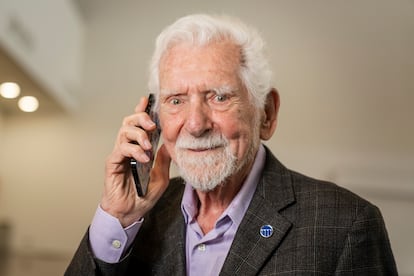Martin Cooper, the engineer who made the first cell phone call 50 years ago: ‘We are just beginning’
‘We knew what we were doing, and the proof of it is that there are currently more mobiles than people on the planet,’ the American engineer explains from the Mobile World Congress in Barcelona


The 94-year-old American engineer Martin Cooper received Spain’s Prince of Asturias award in 2009 for his visionary invention: the cellphone. Martin Cooper enters the press room of the Mobile World Congress in Barcelona and smiles. A new iPhone peeks out of his pocket. “I try them all,” he says. Once again, he retells the story of the first cellphone call, denying that it was inspired by Captain Kirk’s communicator in Star Trek.
Question. Do you still enjoy coming to the Mobile World Congress?
Answer. Of course. I believe we are just beginning in this industry. After 50 years, we’re just at the beginning of what we are going to accomplish with the cellphone industry and the internet. There are three major areas where I think we are going to make progress, starting with education. Teachers have to teach people how to use the internet, how to discriminate between fake news and real news. Education will be revolutionized. The second one is medical science. We can now use sensors to measure what’s going on in the human body. We can do a physical examination every minute and connect you to a computer that will cure the disease before it happens. The third is the concept of collaboration, what people can do when they work together, when distance and time have no meaning. The productivity of humanity will increase enough to eliminate poverty. Those are the big hopes.
Q. It’s an optimistic vision.
A. If I wasn’t an optimist, I’m not sure we would have cellphones.
Q. On April 3, 1973, you made the first call with the Dyna-Trac, a prototype by Motorola, the company you worked for. What do you remember about that call?
A. Our company was under threat by the competition. I thought that what would get attention was a mobile telephone that would replace the wireless system, something that would get people’s attention. My company allowed me to create the very first mobile phone. My team created that phone in three months. We had been working on that technology for years, and we put it all together. I was supposed to demonstrate it on a TV show in New York, but we were cancelled. So we found a reporter and had him come down to make the call, to show him it was really mobile. The phone was one of a kind. It would work for a few minutes and then break.
Q. You’re the Graham Bell of the mobile phone.
A. Ideas are very important, but so is putting the ideas into practice. There are many people who have participated in that. But the world has proven to be very nice, and I appreciate it. The important thing was to know when the technology was ready, and we knew it was in 1973.
Q. Speaking of education, when do you think is the right age to give a cellphone to a child?
A. It’s a complicated question. I can only talk about my personal experience. When my grandchildren were five years old, their mother sometimes was late to pick them up from school and she gave them a phone. Why shouldn’t there be phones for children that can only access certain things? My wife created a company that made phones for elderly people, and the phone was designed to be perfectly simple. Why not have a phone for young children that is only there so their parents could reach them, maybe with some educational games? My principle is that everybody is different from everybody else, and the phone should be designed for the person. In the long run, I think phones will be humanized. Why not have a phone embedded under your skin, so that you can make a phone call without charging the battery because your body is the battery?
Q. I’m worried about the addictions we have to technology. We’re looking at our phones all the time.
A. It is a problem. When I’m driving on the highways, people walk across the street on the phone. It’s crazy. But every technological advance has had negative aspects to it. I have a belief in humanity. I believe that people will figure it out. The most important part of the technology is how it affects people.
Q. How much do you use your cellphone?
A. Not much. When my wife wants to give me orders, she uses the cellphone. I learned that you don’t have to answer the phone. You can leave a message or a picture. All these are different ways of communicating. I don’t need immediate access all the time, but it’s still very valuable to me.
Sign up for our weekly newsletter to get more English-language news coverage from EL PAÍS USA Edition
Tu suscripción se está usando en otro dispositivo
¿Quieres añadir otro usuario a tu suscripción?
Si continúas leyendo en este dispositivo, no se podrá leer en el otro.
FlechaTu suscripción se está usando en otro dispositivo y solo puedes acceder a EL PAÍS desde un dispositivo a la vez.
Si quieres compartir tu cuenta, cambia tu suscripción a la modalidad Premium, así podrás añadir otro usuario. Cada uno accederá con su propia cuenta de email, lo que os permitirá personalizar vuestra experiencia en EL PAÍS.
¿Tienes una suscripción de empresa? Accede aquí para contratar más cuentas.
En el caso de no saber quién está usando tu cuenta, te recomendamos cambiar tu contraseña aquí.
Si decides continuar compartiendo tu cuenta, este mensaje se mostrará en tu dispositivo y en el de la otra persona que está usando tu cuenta de forma indefinida, afectando a tu experiencia de lectura. Puedes consultar aquí los términos y condiciones de la suscripción digital.








































